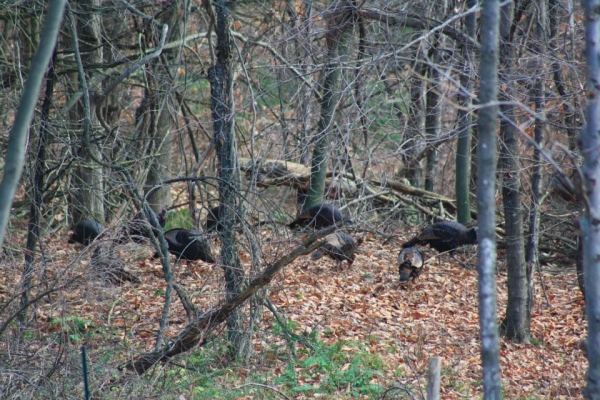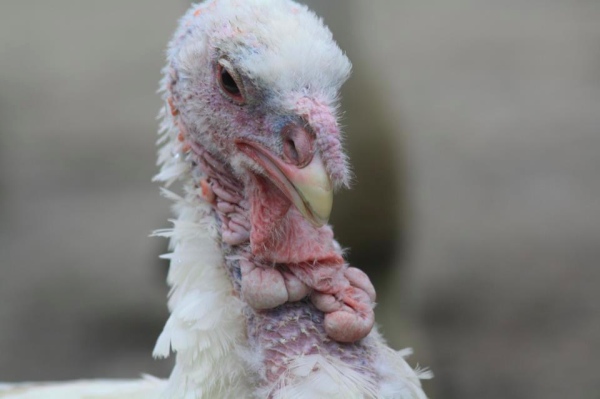Mama T (also known as Mamati) came to the sanctuary from a local small-scale farm, where she had been overcrowded with hens and geese in a small coop with a tiny mud yard. When she first arrived, she was so overweight from lack of exercise that she rarely walked more than a few steps at a time. Now she ranges widely and truly freely, visiting with all of the people and many of the animals at the part of the sanctuary known as “up the hill.”
Mama T is both highly sociable and exceptionally curious, often going out of her way to meet new people or investigate goings-on. Earlier this year, she scared a contractor working inside a trailer by coming inside to see what all the banging was about. The contractor called Cheryl and whispered, “there’s a turkey in the trailer. What do I do?” They made friends, and Mama T dropped by for a visit every day the contractor was on the property.
Despite stereotypes of roosters “ruling the roost,” it’s Mama T who bosses the birds “up the hill.” Every former fighting roosters hop to it when she tells them to get out of her way!
Of course, we are writing about Mama T today because this is the day when so many people choose to express their gratitude for life by killing and consuming a turkey. So, even as we celebrate her verve, we mourn all of the birds whose bodies are used as symbols of conquest and gluttony every Thanksgiving Day.

Wild turkeys at VINE Sanctuary, which reserves more than 60 forested acres as a hunter-free zone for wildlife.
Turkeys are much more than the symbols people make them into. If you want to learn more about turkeys as they really are, while also learning the history of people’s ideas about and uses of these birds, you can’t do better than to read More than a Meal by United Poultry Concerns President Karen Davis.





http://www.psychologytoday.com/blog/animal-emotions/201211/thanksgiving-day-violence-extends-black-friday
In that day (which is already here and now, in my consciousness), sweet birds like Mama T. will live in the free. Part of “in the free” means, to me, the ability and desire of nonhumans to mix and mingle with humans, all of who, in truth, love to share space unselfishly with their beloved fellow creatures.
A pipe dream? Or an existing spiritual reality, which can and will one day be manifested across this wide earth?
By the way, Bravebird, when I read this sentence — “Now she ranges widely and truly freely, visiting with all of the people and many of the animals at the part of the sanctuary known as ‘up the hill.'” — my first thought was: “Aren’t animals people, too?”
I’m impressed with your Spanish! I goodsearched and found ARCA Brasil here: http://www.arcabrasil.org.br/english/index.htm
ARCA Brasil was one of the partners in the Global Hunger Alliance, which was an international coalition of environmental, social justice, and animal advocacy organizations which opposed the globalization of factory farming and promoted plant-based solutions to the world hunger and water crises. As coordinator of that coalition, I traveled Porto Alegre for the World Social Forum in 2003, and of course I memorized a few phases of Portuguese to see me through the process of riding the buses and trains, staying at a non-tourist hotel where nobody spoke English, and navigating the neighborhood of the hotel. I liked the language so much that, when I got home, I read up on its structure and history and also spent maybe a year trying to learn it on my own. But that was so long ago that I’ve forgotten almost everything I learned.
But at least my goof elicited from you a fascinating description of your journey there on behalf of the Global Hunger Alliance. Ditto your “Obrigado!”